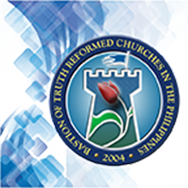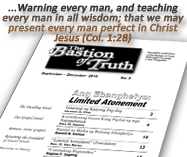

The answer? Simply This: We don't speak in tongues because it isn't biblical to do so.
"But in the New Testament people did speak in tongues. Doesn't that make the practice biblical?"
No. Some things in the Bible pertain to special persons and times; not to us. Jesus raised the dead and the apostles miraculously handled deadly snakes without harm; but we don't do these things today.
The word tongues, in the Bible means languages. To speak in other tongues (note the plural; Scripture is not speaking of some heavenly language) is the ability to preach in foreign languages without having studied or otherwise learned them (Acts.2:8-11). This miraculous gift of the Holy Spirit enabled apostles in their day to teach people in many lands. You can see, then, as Paul plainly said, that tongues had an evangelistic purpose: "tongues are for a sign, not to those who believe, but for the unbelieving" (I Corinthians.14:22).
Because this is true, a language ought not to be used in a congregation that speaks another language. Apart from interpretation, speaking in foreign languages does not edify. And Paul's whole point in these chapters is to stress that all things must be done to edify (or build up) others -I Corinthians.14:26b. To use them in the church was awkward and cumbersome, since they must be interpreted.
God never intended the gift of speaking in tongues to continue indefinitely. Paul expressly wrote, "tongues shall cease" (I Corinthians.13:8). The evangelistic endeavor that established the early church all over the Mediterranean world was carried out under the leadership of the apostles. The apostolic prophetic offices were revelatory (Ephesians.3:5). This is to say, during the period in which the New Testament was being written, both received truth directly from God. Apostles were sent off with the gospel, while prophets seem to have been apostolic assistants. The revelation that they received was recorded in the books we call the New Testament.
Not only did miraculous gifts enable apostles to preach in many languages they did not know but these gifts also attested to their apostolic commission (II Corinthians.12:12) just as miraculous deeds attested to Jesus' evangelistic work (Acts.2:22). Moreover, by extraordinary gifts God confirmed the apostles writings (Hebrews.2:2-4). When the writing of the Scriptures was completed, their authorship needed no further confirmation.
It was during the laying of the foundations of the church alone that miraculous gifts were needed. The offices of apostle and prophet, with whom God deposited these gifts, ceased when that foundation was laid. This is clear from Ephesians.2:20. A foundation is laid at the beginning only; it does not extend up the walls or into the roof!
When Paul said special gifts were "the signs of a true apostle" (II Corinthians.12:12), he surely implied that not all Christians had them. It was only the apostles, and those to whom they imparted them (Acts.19:6, 7; Romans.1:11), who possessed these gifts. Suppose I were to say "Our church meets in a house in the 200 block of Central Avenue - you can't miss it; just look for the sign." But, when you arrived, every house looked alike and all had similar signs! The sign would be useless; it would no longer be a sign. If after Jewish and Gentile Pentecosts (Acts.2:10), when the Holy Spirit came directly, gifts were mediated only by the Apostles (Acts.8:17,18; 19:6,7), then, they would indeed be a sign of a true apostles (II Corinthians.12:12). But only so. If anyone could himself obtain gifts from god, apart from apostles, then tongues would be no more signs to help you identify a true apostle than the signs on Central Avenue.
No, signs and wonders belonged to the foundation period of the church - - a period, presumably, that those who teach otherwise seem not to recognize (even though Paul clearly alludes to it in Ephesian.2:20). They have no more place in the church today than the writing of Scripture. You may assume, therefore, that no matter how well-meaning persons who claim the gift of tongues may be, they have deceived themselves about it. Do not be taken in by their sincerity or the "heavenly gibberish" that they may seem to speak.
Do not look for, pray for or expect miraculous gifts today. There is no warrant for doing so. Focus your attention, instead on the Scriptures and the One of Whom they speak. In Him alone, is the mighty power of God deposited and displayed.

A newsletter/journal published in Filipino (Tagalog dialect) as a ministry of the denomination of Bastion of Truth Reformed Churches in the Philippines. It is primarily a means of instruction as well as a medium to proclaim and explain the convictions of the BTRC concerning the Gospel of God's sovereign particular grace in salvation.